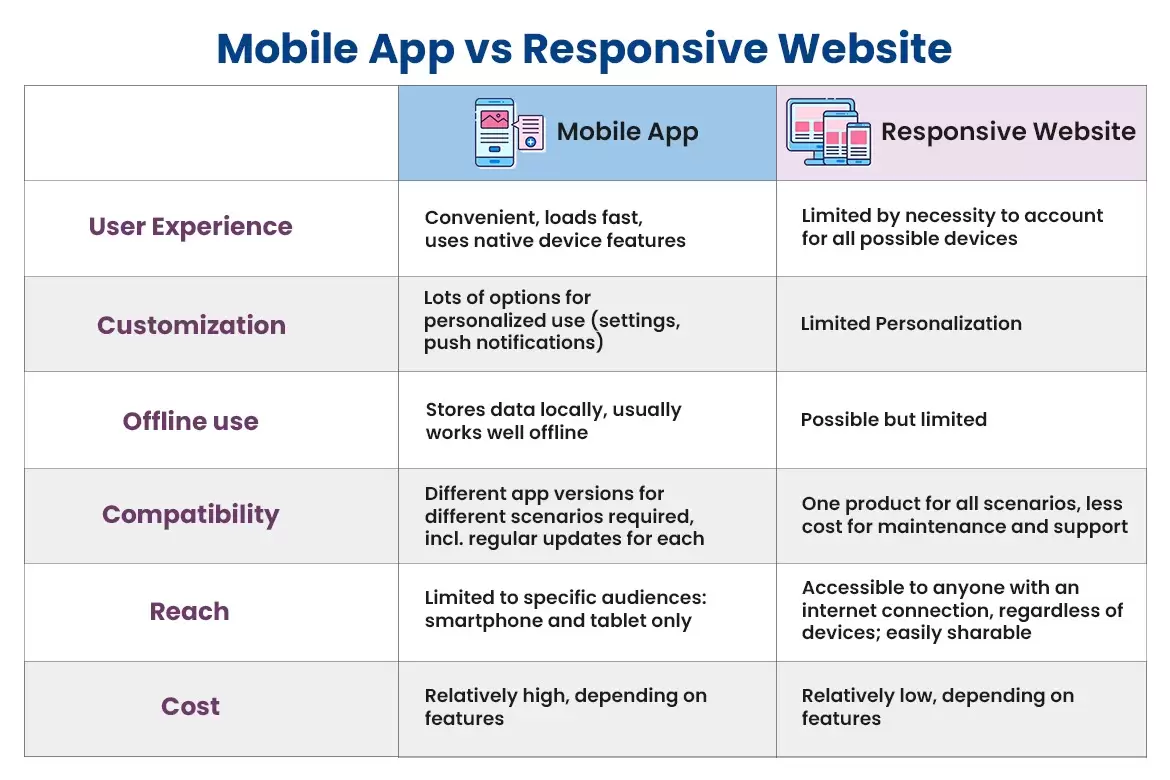
Mobile apps and responsive websites are central to an organization’s business strategy. While it is not always necessary to build a mobile app for customers there are many circumstances that require an app for internal teams or B2B clients as well as b2c customers. The question though is whether an app is required or businesses could be better served by having a responsive mobile website, particularly a Progressive Web App – that behaves like an app but doesn’t require the end user to visit the app store to download it.
Do you need to invest in app development? 5 priority questions to ask
Generally speaking, a responsive mobile website is less costly to develop than a native app. One of the reasons is that the programming language and framework differ for Android apps and iOS apps. That means developing the app and its features twice. Of course, one way to get over it is by building an app that uses cross-platform technology. There are a few pros and cons to that and I have written about that in a previous article.
However, whether you develop a cross-platform or native application, these 5 questions you need to ask as a business. It will help clarify whether you need to invest in a mobile app or look at a responsive website or a PWA.
1. What will your mobile app do that your responsive website can’t?
Do you need access to a mobile device’s camera, for instance, a fitness app would need access to not just a camera but require to track a user’s activity. If a business requires functionality with a high degree of personalization then it would be essential to build a mobile app. A responsive mobile website would not be suitable for any function that needs features like a smartphone’s GPS system etc.
2. Do you expect the users of your product or service to have a long relationship with you?
This is an important criterion when going for a mobile app. A user does not want to download an app that they will not use too much. The question to ask before building an app is; are you catering to casual users or power users? In the latter instance, app development makes sense.
You could have a big marketing budget to launch your app and increase the app downloads. If users cannot find a reason to use your app frequently then you will find the cost of user acquisition is not returning the expected ROI because of the high number of uninstalls. In such cases, a responsive mobile app would serve your business better.
If your business has customers that might interact with you once in a while and also customers who come online frequently, then the best option would be to have both a responsive website as well as mobile app(s).

3.Will you rely on push notifications to engage with your users?
If you want to send in-app push notifications then of course you need to develop a mobile app. You can have push notifications for both apps and responsive websites but they work differently.
Let’s say you have a news or e-commerce website and have breaking news or a short-duration offer. You can send push notifications through text messages or emails to your users. However, they need to opt in by sharing their email ID or mobile number. A web push will lead a user to a website.
In the case of mobile apps, the above type of push notification is also used but the main one is in-app push notifications that open inside the app. If push notifications are a major part of your user experience then the choice is clear – build mobile apps. For instance, event-based apps rely heavily on push notifications. This is also particularly important when building a CRM for your customers, a mobile app can be easier to access and engage with even in offline mode.
4. Do your users need to interact with other apps and also share information?
Many app-to-app transactions are only possible on a mobile phone. While a responsive mobile site can interact with apps, it is very limited. In such cases, a mobile app will serve your business intent better.
There are two kinds of app-to-app interactions. One is passing data from one application to another and the other is when one app provides certain functionality to another app.
One feature of using another app’s functionality is that it usually works in the background and provides results on the owner’s interface. For instance, an app can send a user’s location to GPS data for a location or an app might even ask for permission to access the user’s contacts or camera.
Mobile app developers can also set boundaries for interactions with other apps by restricting how other apps can interact with your app
5. How much will it cost to develop an app?
Again, this depends on the mode you decide on. If you have your own in-house team of developers, then ignore this. If your organization prefers to outsource app development (avoid these pitfalls), then it depends on location and your technology partner. It also depends on the complexity of your app features.
Let’s look at a ballpark cost to develop an app based on the above two criteria:
A typical freelance developer charges up to $150 per hour in the USA while this cost would be around $20 in Asia.
The preferred option is to outsource to a development team at an agency or software development company. In the USA this would be around $150 to 250 per hour. While in Asia, it would cost around $30 to $75. Of course, many software companies might not charge by the hour but rather according to the project.
Now coming to how long it will take to develop a basic mobile app with simple features:
The planning stage can take up to 2 sometimes 3 weeks. The design stage and pre-development can take approximately 5 weeks. The development stage, including backend development and front-end development and testing, can take 8 to 10 weeks.
In our opinion, a responsive website should come first, and then build an app over it. Most times, users want to understand how the service provided will benefit them. They first look for information. Once convinced, they become more loyal and engaging on a mobile app. Of course, some services and products are wholly suited only for a mobile app experience.
ITech is a mobile app and web application development company with 19 years in software development. We have our office in Dallas with our development center in Chennai, led by a senior technical team. Have a look at our client case studies and we would be happy to discuss your software project at a time suitable to you.

